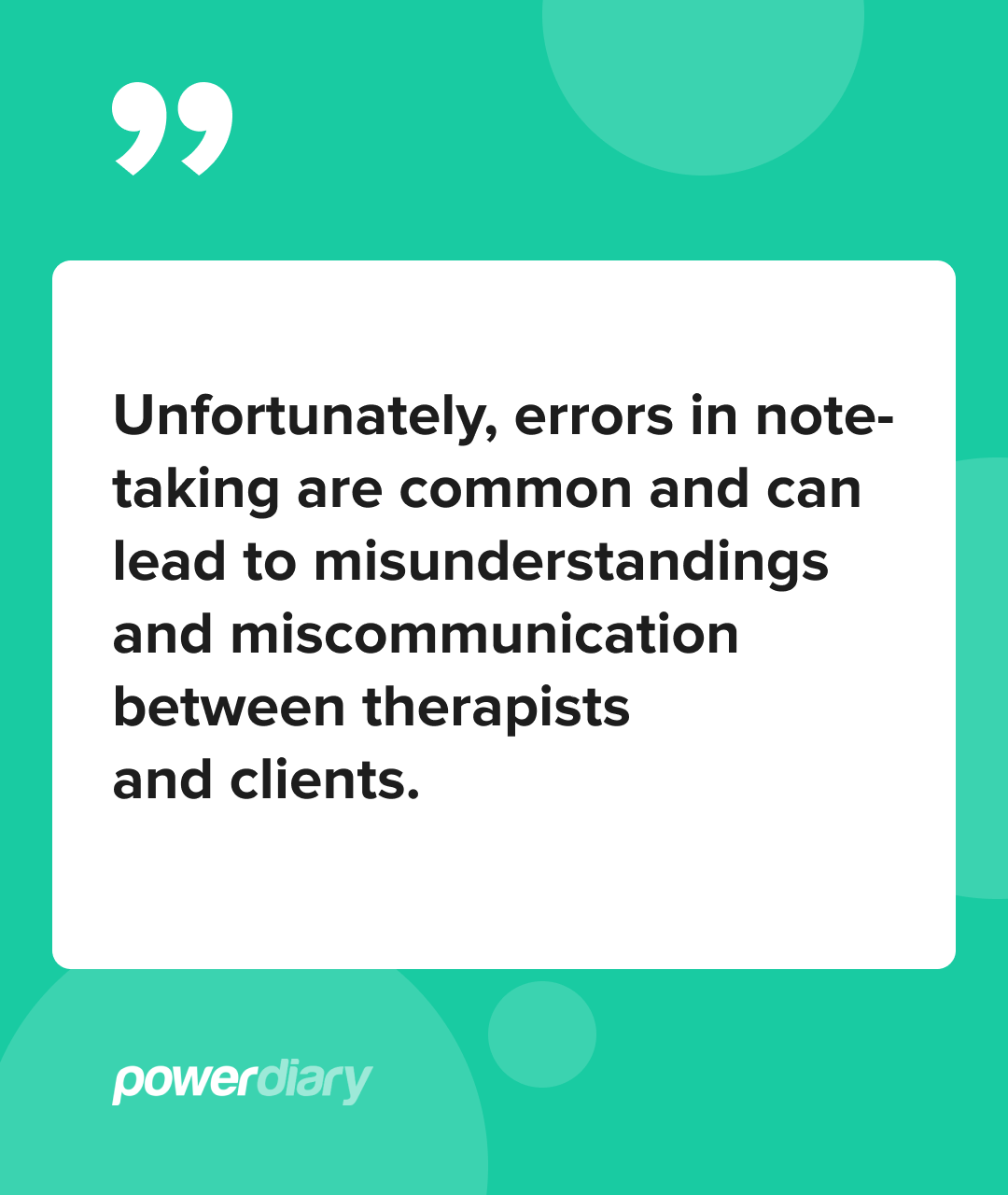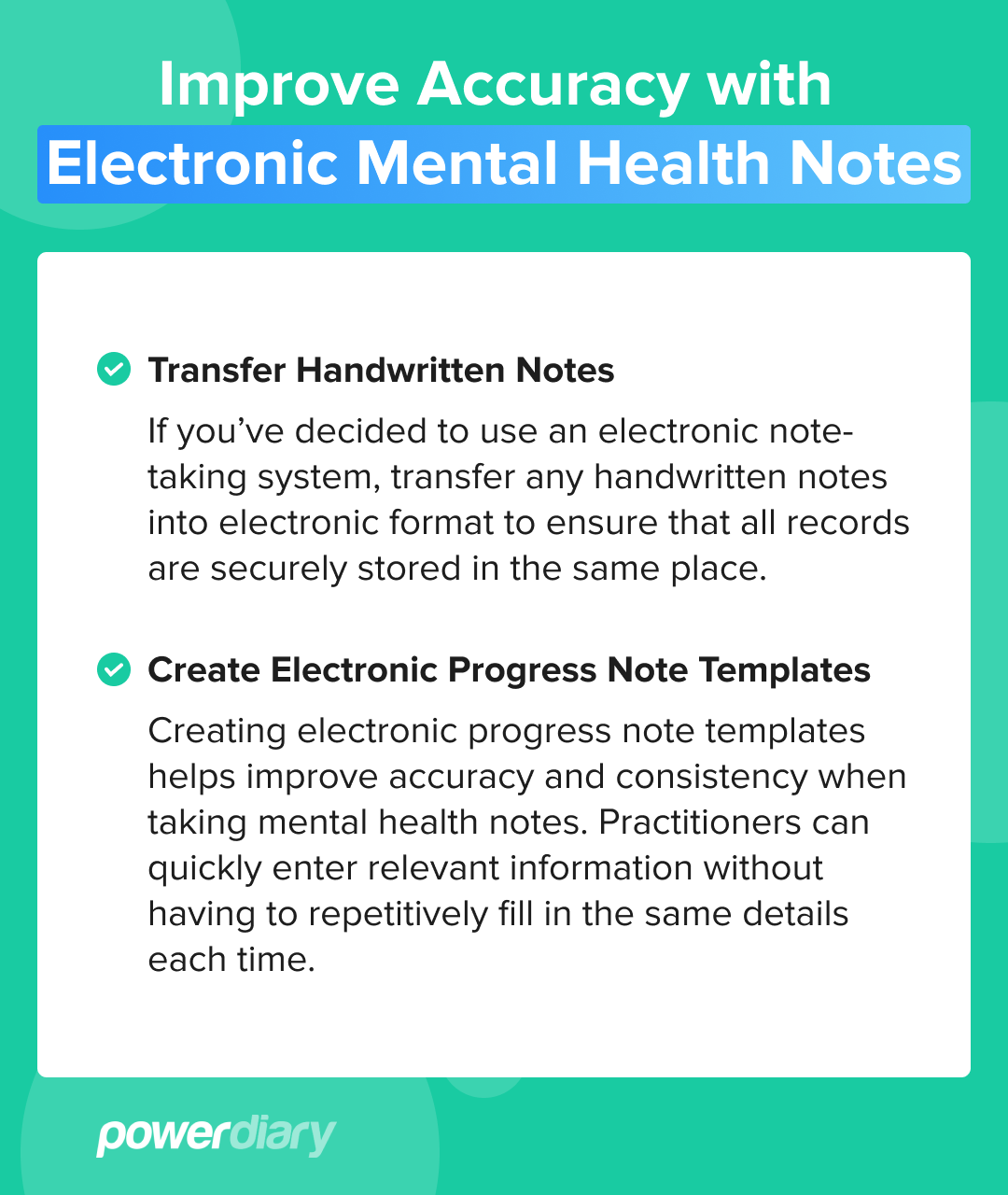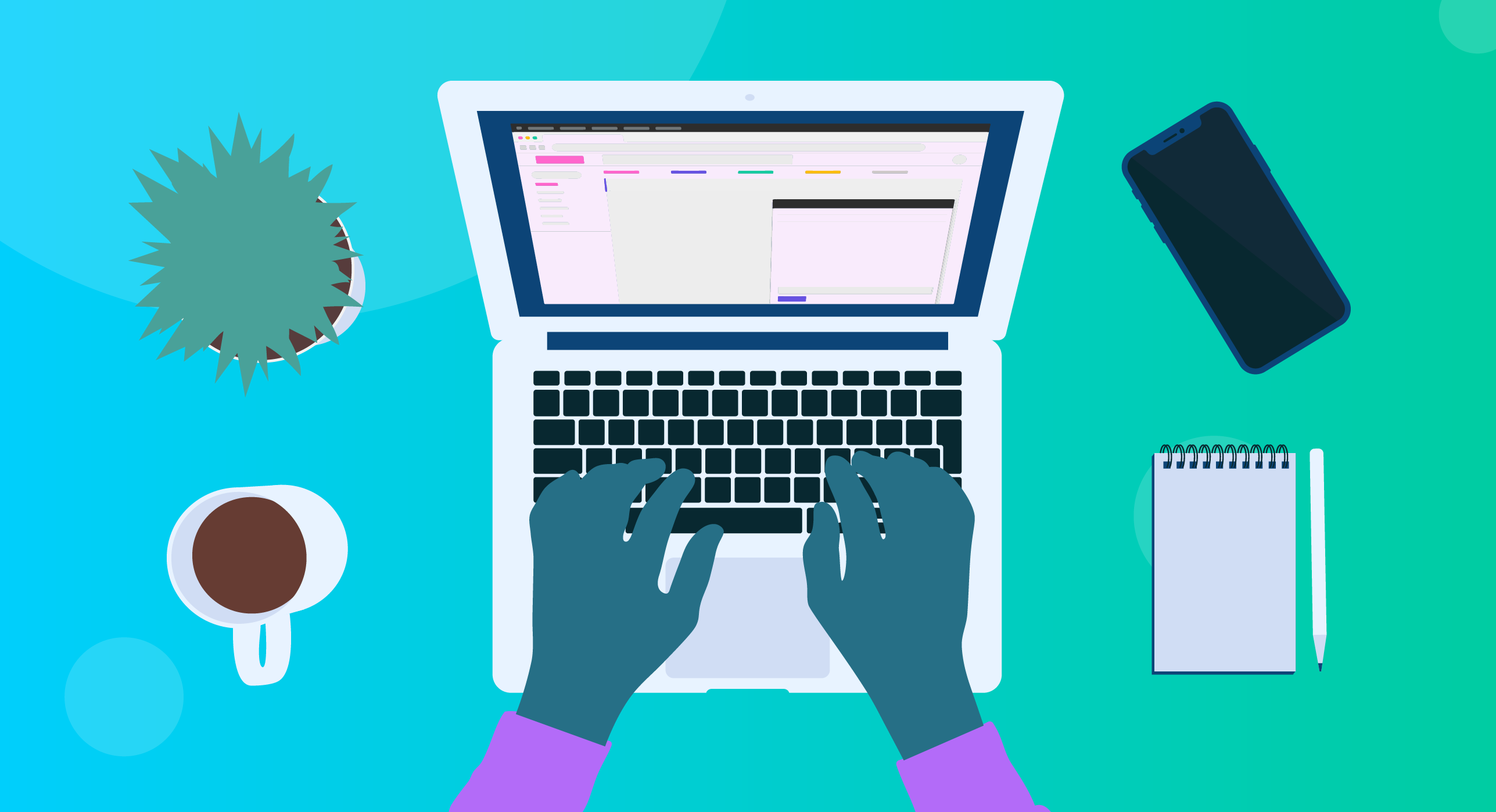Mental health progress notes are an important part of any mental health professional’s workflow. They serve to document the progress of clients over time and provide a record of the therapeutic process. They can also be used as evidence in court if needed, so accuracy is paramount. With practice management software, writing progress notes for mental health clients is easier than ever, while also ensuring that notes are precise and of course secure.
This article discusses some common mistakes to avoid when taking mental health notes and offers practical guidance on how to write progress notes more effectively using therapy note-taking software.
The Most Common Errors in Progress Note-Taking
Mental health is a sensitive and complex field of practice, requiring practitioners to maintain accurate notes to provide the best possible care for their clients. Accuracy is essential for providing an effective therapy session and tracking the progress of clients over time. Unfortunately, errors in note-taking are common and can lead to misunderstandings and miscommunication between therapists and clients.
Here are some of the most common mistakes when taking mental health notes.
- Messy and illegible handwriting – Taking notes with messy and illegible handwriting can lead to errors and miscommunication. Messy handwriting can also be a time-consuming mistake to rectify, as it requires re-reading and deciphering what was written to accurately interpret it.
- Obscurity – Mental health notes should be as precise and clear as possible to ensure accuracy. Avoid the use of ambiguous language and abstract concepts that are open to interpretation.
- Neglect of suicidal ideation – It’s essential for practitioners to note any suicidal thoughts, feelings, or intentions that clients may disclose during sessions. This should be noted in detail as it’s important for the practitioner to identify any potential risk factors and provide appropriate care. Even if no suicidal risk factors are present it is important to document this in the mental health notes as it demonstrates the therapist has assessed this.
- Broken confidentiality – Mental health notes should never be shared or discussed with anyone outside of a session without the express written consent of the client. To maintain client confidentiality, notes should remain secure at all times.
- Confusing shorthand – Practitioners sometimes use shorthand to take notes quickly. However, using shorthand can lead to misunderstandings if it’s not universally understood.
- Failing to comply with legal requirements – Mental health notes should always be taken in accordance with the relevant laws and regulations of the practitioner’s jurisdiction. Failing to do so can lead to legal issues for the practitioner and their business.
How to Avoid Common Pitfalls of Writing Mental Health Notes
Use Therapy Note-Taking Software
The use of therapy note-taking software can help practitioners avoid common pitfalls while writing progress notes. Digital notes are legible, accurate and secure, meaning that they can be easily read, understood, and accessed by approved personnel when needed.
Digital notes can be configured to include specific fields relevant to the client’s case, allowing practitioners to easily track progress over time. They provide a simple way for practitioners to store and share notes with other clinicians, helping facilitate better communication between professionals. And for extra peace of mind, digital notes can be backed up and stored securely in the cloud, offering additional security and protection from any data breaches or loss of physical documents.
Use Clinical Language
When taking mental health progress notes, practitioners should use precise clinical language. Notes should clearly state the client’s symptoms and progress, as well as any treatments provided during sessions.
Avoid using vague terms or abstract concepts that are open to interpretation, and focus on providing clear descriptions of the client’s condition, thoughts, and behaviours. Using specific terms and language helps ensure that notes are accurate, understandable, and reliable.
Include Details if Your Client Is Suicidal
If a client reports suicidal ideas or any thoughts of self-harm, it’s important to include this in the notes. Practitioners should document any risk factors that could lead to a suicide attempt, as well as the extent of the suicidal ideation, and any plans for self-harm. This information can help practitioners identify potential risks and provide appropriate care for their clients.
If the practitioner is considering hospitalisation or referral to another provider, they should also include this in the progress notes and provide reasoning for the decision.
Don’t Include Names Unless Necessary
When taking mental health progress notes, it’s important to avoid using any names or identifiers that could reveal the identity of any third party unless necessary. This includes names of family members, employers and other individuals who may come up when discussing the client’s mental health.
Sometimes, another clinician or a lawyer may need to review the notes, which increases the risk of any identifying information being exposed. This can have legal ramifications for the practitioner, so it’s important to take extra steps to protect the confidential information of all involved parties. This may include redacting any identifiable details of third parties such as addresses, phone numbers and other information.
Avoid Relying on Shorthand or Jargon
It’s important to write mental health notes using full-length words and phrases, rather than relying on shorthand or jargon. This helps ensure that the content of the notes is clearly understood by other clinicians if they need to review them in future.
Using plain language also makes it easier to access information quickly and accurately. These records may be used to make decisions about the client’s care in the future, so it’s essential to use language that can’t be misconstrued.
Adhere to Legal Requirements for Mental Health Progress Notes
When taking mental health progress notes, practitioners must adhere to legal requirements to avoid finding themselves in any legal trouble. The notes must be clear and accurate to allow for potential collaboration with other professionals if needed.
Practitioners should also be aware of any applicable federal, state or local laws regarding progress note requirements. Additionally, practitioners should avoid making any false statements in the notes, as this can have serious consequences in some circumstances. To minimise the risk of this ensure that it is clear when you are quoting a client rather than expressing your clinical opinion. Being familiar with and following all applicable laws and regulations helps ensure that the progress notes are a reliable and secure record of the client’s treatment.
Improve Accuracy with Electronic Mental Health Notes
Transfer Handwritten Notes
If you’ve decided to use an electronic note-taking system, transfer any handwritten notes into electronic format to ensure that all records are securely stored in the same place.
When you import scanned written notes into Power Diary, you can add tags that allow for quick searches within the record. This makes it easier to find specific pieces of information when needed and ensures the information is easier to reference in future.
Create Electronic Progress Note Templates
Creating electronic progress note templates helps improve accuracy and consistency when taking mental health notes. Practitioners can quickly enter relevant information without having to repetitively fill in the same details each time.
Templates should be tailored to include all information required in the mental health record. Depending on the type of service, templates can also be used to capture specific information like diagnoses, medications, and treatments.c
DAP Progress Notes
DAP Progress Notes are a type of mental health note that uses the Data, Assessment, and Plan methodology to document client progress. This type of note is focused on capturing information about the client’s progress over time, including any changes in their behavioural or emotional reactions to various situations.
- Data – This section captures objective information such as appointment date and time, as well as a description of the client’s symptoms.
- Assessment – This section includes any analysis or evaluation that has been made about the client, such as a diagnosis or risk assessment.
- Plan – This section outlines any goals or steps that have been set to address the client’s needs.
Custom DAP templates can easily be created and saved in Power Diary.
SOAP Progress Notes
SOAP Progress Notes are a type of mental health note that uses the Subjective, Objective, Assessment, and Plan (SOAP) methodology to document client progress. The purpose of this note type is to accurately capture information about the client’s current state and their response to treatment or interventions.
- Subjective – This section captures information and statements shared by the client, such as their primary reason for the appointment.
- Objective – This section captures factual information such as a diagnosis, signs and symptoms, and the client’s mood and appearance.
- Assessment – This section includes documentation of what the practitioner noticed in the session, as well as the interpretation of objective and subjective information. This may include impressions of the client’s mood, risk or harm and progress towards goals.
- Plan – This section outlines any goals or steps that have been determined to address the client’s needs.
Power Diary includes pre-designed SOAP templates in its template library. The existing templates can be adapted to meet the needs of individual practice. Of course, you can also create your own templates completely from scratch.
GIRP Progress Notes
GIRP Progress Notes are a type of mental health note that uses the Goals, Interventions, Response, and Plan (GIRP) methodology to document client progress. They are used to capture information about client goals, interventions and treatments being used to help achieve those goals, the response of the client to these interventions, and any changes that need to be made for progress to occur.
- Goal – This section captures specific objectives or targets that are set for progress to occur.
- Intervention – This section captures any action taken by the practitioner or client to help move towards those goals.
- Response – This section captures both qualitative and quantitative measures of progress that have been made towards reaching the goals.
- Plan – This section outlines any changes that need to be made for progress to continue or for additional goals to be achieved.
GIRP templates can easily be created and saved in Power Diary.
Start Taking Electronic Mental Health Progress Notes
It’s time to start taking notes electronically! Using the format of your choice, be sure to document any and all changes in the client’s behaviour, any progress or setbacks that have been made, and any interventions or treatments that are being employed. Be sure to capture your thoughts and impressions so that you can easily refer back to them later. Lastly, save any notes you take for an accurate record of the client’s progress.
Mental Health Notes Software for Every Practitioner
Therapy Progress Notes
Being a therapist is incredibly rewarding, but it can come with a lot of paperwork. With therapy note-taking software, therapists can easily capture key insights about their client’s condition and progress, quickly generate mental health progress notes in the preferred format, and securely store records. This saves therapists time and energy to put towards other aspects of their practice.
Psychologist Progress Notes
Psychologists may find it overwhelming to accurately keep track of each client’s progress. Using software to write mental health notes makes this task much easier, allowing psychologists to quickly document important insights about clients’ conditions and monitor responses to treatment.
Counsellor Progress Notes
Counsellors are tasked with the important job of helping their clients make positive life changes. Using software to take progress notes for mental health is a great way to effectively document client sessions and keep track of any interventions they’ve used.
Social Worker Progress Notes
Social workers face some uniquely challenging situations when it comes to taking mental health progress notes. Using software is a great way to ensure that social workers can track and document key details of each case, while also keeping client information secure.
Other Mental Health Specialists
Mental health specialists in all disciplines can benefit from using therapy note-taking software. The right software will allow clinicians to take different types of mental health progress notes and simplify the note-taking process, unlocking significant time and energy that can be channelled into other parts of the practice.
Try Power Diary Today
Mental health specialists looking for an efficient way to take mental health progress notes are finding the solution they need in Power Diary. Our practice management software offers comprehensive therapy note-taking software with everything you need to easily capture, store, and organise your notes. Try it for free today and see how easy it is to streamline your documentation process.







